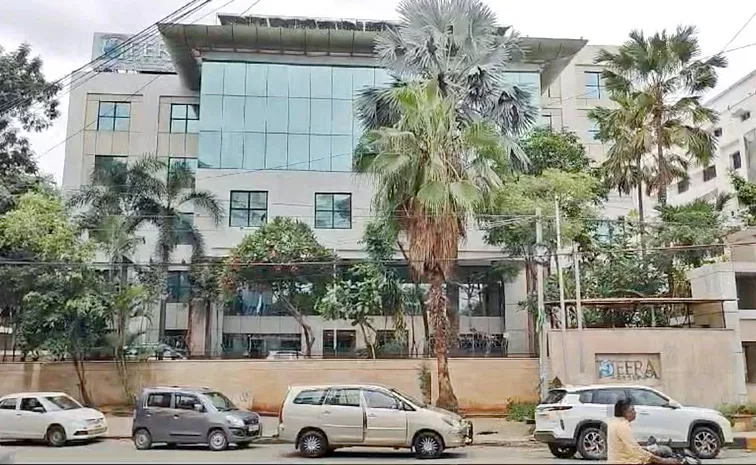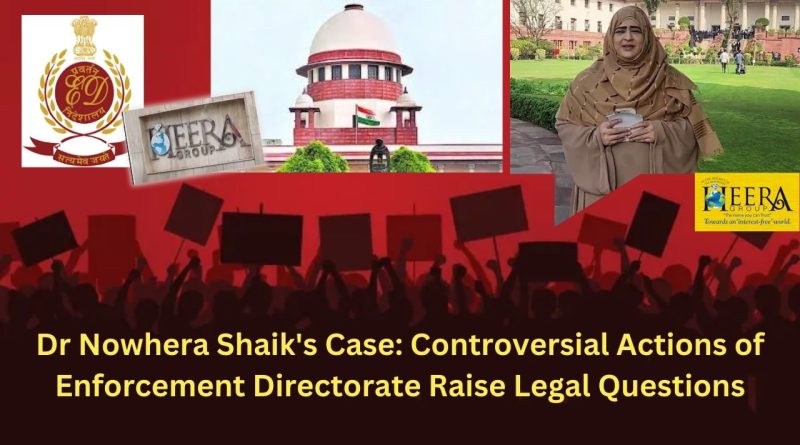Dr Nowhera Shaik’s Case: Controversial Actions of Enforcement Directorate Raise Legal Questions
Enforcement Directorate’s Conduct in Heera Group Case Sparks Debate on Judicial Compliance
The case of Dr Nowhera Shaik and the Heera Group has become a focal point in the Indian legal landscape, marked by a series of controversial actions by the Enforcement Directorate (ED). This complex legal battle highlights the challenges faced when different investigative agencies and judicial bodies are involved in a single case. The ongoing dispute raises important questions about the adherence to court orders and the potential consequences of non-compliance.

The Legal Battle Begins
The legal saga took a significant turn on December 23, 2019, when the Telangana High Court granted bail to Dr Nowhera Shaik. This decision was made with the intention of ensuring a focused and impartial investigation by the Serious Fraud Investigation Office (SFIO), without interference from other agencies that could potentially complicate matters. This court order marked an initial legal victory for the Heera Group and Dr Nowhera Shaik, setting the stage for the events that followed.
Table of Contents
Raids and Seizure of Dr Nowhera Shaik’s Properties
The Enforcement Directorate stands accused of conducting raids on Dr Nowhera Shaik’s properties and those of her associates, including employees of the Heera Group. These raids allegedly took place in spite of explicit orders from the Supreme Court and Telangana High Court prohibiting other agencies from investigating the case.

The ED’s actions reportedly involved:
- Seizure of assets
- Confiscation of cash
- Acquisition of documents
Dr Nowhera Shaik contends that these actions were in violation of both court orders and the provisions of the Prevention of Money Laundering Act (PMLA).
Supreme Court’s Concerns and Property Dispute
On March 28, 2023, the Supreme Court issued an order expressing concerns about land disputes involving Dr Nowhera Shaik. The court acknowledged that while buyers were aware of the ongoing disputes, they were still willing to proceed with their investments.
The court proposed a solution: if these buyers deposited approximately Rs. 641 crores, the ED’s attachment on the land would be lifted, allowing the parties to resolve their legal claims independently. However, it is alleged that the ED obstructed this process, leading to encroachments on the property that was meant to be used for repaying investors.
The petitioner argues that these encroachments, occurring under the ED’s watch, represent a serious violation of legal norms and have further complicated the resolution of the case.

Implications of ED’s Actions
The ED’s alleged continuous failure to comply with court orders and its actions that contradict judicial directives raise serious questions about the agency’s conduct. These actions have several implications:
- Undermining Judicial Authority: By disregarding court orders, the ED’s actions could be seen as undermining the authority of the judiciary.
- Complicating Case Resolution: The ED’s involvement, despite court orders to the contrary, has potentially made the resolution of the case more complex.
- Violation of Rights: The raids and seizures, if conducted in violation of court orders, could be seen as an infringement on the rights of Dr Nowhera Shaik and the Heera Group.
- Erosion of Public Trust: Such actions by a government agency could lead to erosion of public trust in investigative bodies.
- Legal Consequences: The ED’s actions could potentially lead to contempt of court proceedings.
Conclusion
The case of Dr Nowhera Shaik and the Heera Group serves as a stark reminder of the complexities that can arise in high-profile legal cases involving multiple agencies and judicial bodies. The alleged actions of the Enforcement Directorate, if proven true, raise serious questions about the agency’s compliance with judicial orders and its role in the investigative process.
As this case continues to unfold, it will be crucial to monitor how the courts address these allegations of non-compliance and what measures, if any, are taken to ensure that investigative agencies operate within the bounds of their legal mandates and in accordance with judicial directives.
The resolution of this case could have far-reaching implications for the conduct of investigative agencies in India and the importance of adherence to court orders in maintaining the integrity of the justice system.



